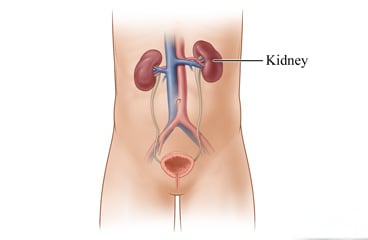
Overview
Healthy kidneys remove wastes from the blood. They also help balance water, salt, and mineral levels in the blood. Nephrotic syndrome is a sign that your kidneys aren't working right. When you have this kidney problem, you have high levels of protein in your urine. You may also have low levels of protein and high levels of cholesterol in your blood.
The most common symptom is swelling around the eyes or in the feet or ankles. You may also notice foamy urine or weight gain from fluid buildup. The syndrome also increases the risk of infections.
Diabetes is the most common cause of the syndrome. It can also be caused by kidney disease, lupus, some infections, and certain cancers. In some cases, the cause is not known.
Which treatment you get depends on your age and what health problem is causing nephrotic syndrome. Your doctor might prescribe medicines. You might also need other treatments if the syndrome is causing other problems, such as high blood pressure or high cholesterol.
Follow-up care is a key part of your treatment and safety. Be sure to make and go to all appointments, and call your doctor if you are having problems. It's also a good idea to know your test results and keep a list of the medicines you take.
How can you care for yourself?
Work with your doctor
- If your doctor prescribed medicines, take them as prescribed, even after you start to feel better. Call your doctor if you think you are having a problem with your medicine.
- See your doctor regularly to have your kidney function checked.
- Make sure your doctor knows about all the medicines, vitamins, or herbal supplements you take. This means anything you take with or without a prescription.
- Stay up to date on your COVID-19 vaccines. Get a flu shot each year. And get any other shots your doctor suggests.
Care for yourself at home
- Cut down on salt. This can reduce the amount of water your body retains.
- Follow your doctor's advice for the amounts of protein and potassium you need in your diet.
- Having nephrotic syndrome increases your risk for infections like peritonitis or respiratory and skin infections. Here are some tips to stay healthy:
- Wash your hands often, especially before eating and after being in public places.
- Avoid people who are sick.
- Use mild soaps, such as Dove or Cetaphil.
- Use moisturizing lotion after you bathe. You can use it more often if your skin is dry. Choose a lotion with no alcohol.
When should you call for help?
Call 911 anytime you think you may need emergency care. For example, call if:
- You have sudden, severe pain in your belly.
Call your doctor now or seek immediate medical care if:
- You have new or worse swelling.
- You have trouble breathing.
- You have a fever.
- You have symptoms of a skin infection, such as:
- Increased pain, swelling, warmth, or redness.
- Red streaks leading from the area.
- Pus draining from the area.
- A fever.
Watch closely for changes in your health, and be sure to contact your doctor if:
- You do not get better as expected.
Where can you learn more?
Go to http://www.healthwise.net/patientEd
Enter H206 in the search box to learn more about "Nephrotic Syndrome: Care Instructions".
Current as of: October 11, 2024
Author: Ignite Healthwise, LLC Staff
Clinical Review Board
All Ignite Healthwise, LLC education is reviewed by a team that includes physicians, nurses, advanced practitioners, registered dieticians, and other healthcare professionals.

